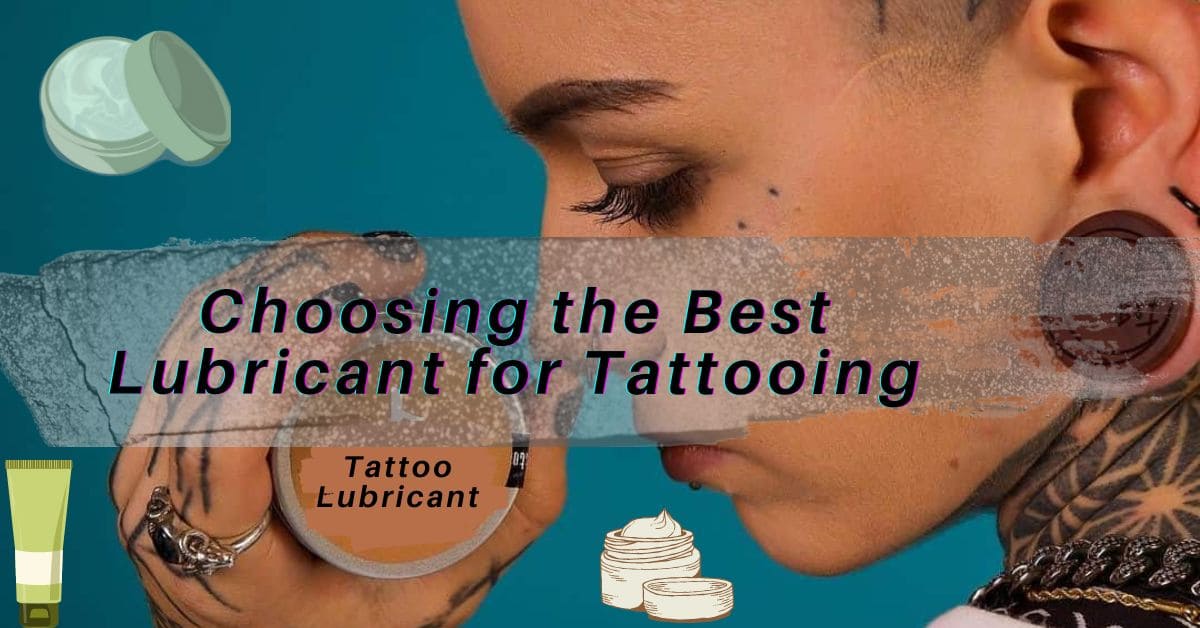Introduction
Tattooing is an art form that requires precision, skill, and the right tools. Among these tools, choosing the best lubricant for tattooing plays a crucial role in achieving outstanding results. Whether you’re a professional tattoo artist or a client getting inked, the lubricant used during the tattooing process can significantly impact the final outcome. It not only helps the needle glide smoothly but also ensures the comfort and safety of both the artist and the client.
Need a guide about tattoo aftercare? Please read this article, It contains all the aftercare info you will need. The tattoo is the art that comes from the soul. You’ll have to put some extra effort into its aftercare. Here is a comparative article about tattoo aftercare products.
In this comprehensive guide, we will delve into the world of tattoo lubricants, exploring their importance, different types, and key factors to consider when choosing the best lubricant for tattooing. We will also address frequently asked questions and provide expert recommendations to make your tattooing experience exceptional.
Let’s start with some recommendations in case you are looking for one quickly! and then we will deep dive into the factors of tattoo lubricant.
Top Recommendations for Tattoo Lubricants
Now that you understand the importance of lubricants and the factors to consider,
Here are some top recommendations for lubricants that are best for tattooing:
Tattoo Goo
A well-known brand in the tattoo industry, Tattoo Goo offers a range of water-based lubricants that provide excellent glide and hydration. They are hypoallergenic and suitable for all skin types.
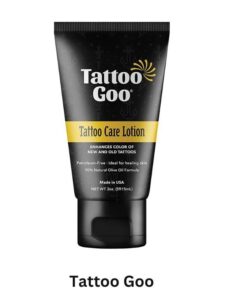
Hustle Butter
This multi-purpose tattoo balm is a favorite among many tattoo artists. It is made from natural ingredients, including shea butter and coconut oil, and offers a smooth tattooing experience.
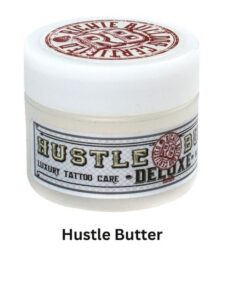
Saniglide
This is a water-based lubricant that you infuse with vitamin E, an antioxidant that helps prevent scarring and slows the rate of aging.
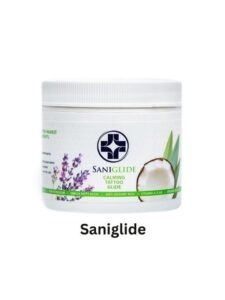
Panthera
Panthera lubricants gain recognition for their high-quality ingredients and superior performance. They offer a range of lubricants tailored to specific tattooing styles, ensuring optimal results.
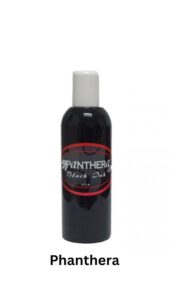
After Inked
After Inked promotes healing and keeps the skin moisturized, making it a popular choice for a water-based lubricant. It is vegan-friendly, fragrance-free, and suitable for sensitive skin.
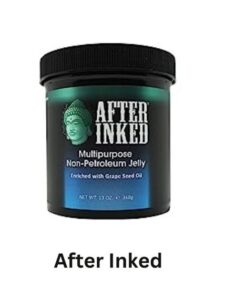
Disclaimer:
It’s important to note that individual preferences may vary, and what works for one person may not work for another. Always consult with your tattoo artist for personalized recommendations based on your specific needs and skin type.
Importance of Lubricants in Tattooing
Tattooing is an intricate process that involves puncturing the skin with a needle to deposit ink. During this process, a lubricant is applied to the skin to reduce friction, allowing the needle to glide smoothly. Lubricants also help to keep the skin moisturized, which can contribute to the overall healing process.
Choosing the best lubricant for tattooing and using a high-quality lubricant is essential for several reasons. Firstly, it ensures that the tattoo artist has full control over the needle movement, allowing for precise and accurate lines and shading. Secondly, it minimizes discomfort for the client, as the lubricant helps reduce any pain or irritation caused by the needle.
Moreover, lubricants create a barrier between the needle and the skin, reducing the risk of infection and cross-contamination. They also prevent excess bleeding and aid in the healing process by keeping the tattooed area moisturized.
Understanding Different Types of Tattoo Lubricants
When it comes to tattoo lubricants, there are several options available in the market. Each type offers its unique properties, advantages, and considerations. There also many moisturizers, lotions, and so on. Understanding these different types can help you make an informed decision when choosing the best lubricant for tattooing.
Water-Based Lubricants: A Popular Choice
Water-based lubricants are a popular choice among tattoo artists and clients alike. They are made primarily from water and contain a blend of other ingredients such as glycerin or aloe vera. These lubricants are known for their easy application and quick absorption into the skin.
One of the significant advantages of water-based lubricants is their compatibility with all tattooing styles and techniques. They work well for linework, shading, and color packing, making them versatile and suitable for various tattooing stages.
Water-based lubricants are also easy to clean and wipe off during the tattooing process. Their non-greasy nature prevents excess ink from sticking to the skin, ensuring better visibility for the artist.
Tip: When choosing a water-based lubricant, look for one that is fragrance-free and hypoallergenic to minimize the risk of skin irritation.
Silicone-Based Lubricants: For Optimal Glide
Silicone-based lubricants are known for their superior glide and long-lasting effects. They are typically made from a combination of silicone oils, which provide excellent lubrication properties. These lubricants offer a smooth and effortless tattooing experience, as the needle glides effortlessly across the skin.
One of the key advantages of silicone-based lubricants is their ability to create a protective barrier on the skin. This barrier helps retain moisture, reduces redness, and minimizes the chances of infection during the healing process.
Silicone-based lubricants are also popular for their long-lasting effects. They require less frequent reapplication, allowing the tattoo artist to focus on the artwork without interruptions.
Tip: It’s important to note that silicone-based lubricants may not be suitable for clients with silicone allergies or sensitive skin. Always perform a patch test before using any new product.
Petroleum Jelly: The Classic Tattoo Lubricant
Petroleum jelly, commonly known by the brand name Vaseline, has long been a go-to option for tattoo artists. It is a semi-solid mixture of hydrocarbons that provides excellent lubrication and moisturization.
Petroleum jelly is widely favored for its affordability and easy availability. It is often used during the initial stages of tattooing, such as outlining, as it allows the needle to glide smoothly across the skin.
While petroleum jelly is effective as a lubricant, it does have some limitations. It tends to be greasier compared to other lubricants and can make it challenging for the tattoo artist to see the tattooed area clearly. Additionally, petroleum jelly can clog pores and may not be the best choice for clients with oily or acne-prone skin.
Tip: If using petroleum jelly, ensure it is free from added fragrances or dyes that may irritate the skin.
Hypoallergenic Options: Safe for Sensitive Skin
For clients with sensitive skin or known allergies, hypoallergenic lubricants are the ideal choice. These lubricants are specially formulated to minimize the risk of skin irritation and allergic reactions.
Hypoallergenic lubricants are typically free from common allergens such as fragrances, dyes, and preservatives. They are designed to be gentle on the skin while providing effective lubrication during the tattooing process.
When selecting a hypoallergenic lubricant, it’s crucial to read the ingredients list carefully and look for products that have undergone dermatological testing. This ensures that the lubricant is safe for use on sensitive skin and minimizes the risk of adverse reactions.
Tip: Always consult with your tattoo artist or dermatologist if you have any concerns about potential allergic reactions or skin sensitivity.
Choosing the Right Lubricant for Different Tattoo Styles
Different tattoo styles and techniques require specific lubricants to achieve the best results. So choosing the best lubricant for tattooing and understanding which lubricant works best for each style can help enhance the overall tattooing experience.
Traditional or Neo-Traditional Tattoos
Traditional and neo-traditional tattoos are characterized by bold lines, vibrant colors, and heavy shading. For these styles, a lubricant that offers excellent glide and visibility is essential. Water-based or silicone-based lubricants are often the preferred choices as they provide optimal control and saturation of colors.
Realism Tattoos
Realism tattoos aim to replicate real-life images with intricate details and shading. Achieving smooth transitions and lifelike textures requires a lubricant that allows for precise control and blending. Silicone-based lubricants with their superior glide and long-lasting effects are commonly used for realism tattoos.
Fine Line Tattoos
Fine line tattoos involve creating intricate and delicate designs using thin, precise lines. Lubricants that facilitate precise needle movement and offer excellent visibility are crucial for this style. Water-based lubricants are often the preferred choice, as they allow for detailed linework without smudging or excess bleeding.
Black and Gray Tattoos
Black and gray tattoos rely on shading techniques to create depth and dimension. These tattoos often require extended tattooing sessions, making a long-lasting lubricant essential. Silicone-based lubricants offer the necessary glide and moisture retention for smooth shading sessions.
Color Tattoos
Color tattoos require vibrant and saturated pigments to achieve their desired impact. Lubricants that enhance color saturation and prevent ink migration are vital for these tattoos. Water-based lubricants are often favored, as they allow for better color visibility and control.
Dot-work Tattoos
Dotwork tattoos are created by meticulously placing dots to form intricate patterns and designs. Achieving precision and consistent dot placement is crucial for this style. Lubricants that offer good needle control and prevent excess bleeding are preferred. Water-based lubricants are often the go-to choice for dot-work tattoos.
Tip: Consult with your tattoo artist to determine the most suitable lubricant for the specific style and design you have in mind. Their expertise and experience can guide you toward the best choice.
Factors to Consider When Choosing the Best Tattoo Lubricant
When choosing the best lubricant for tattooing, several factors come into play. Considering these factors can help you make an informed decision and ensure a smooth and successful tattooing experience.
Skin Sensitivity
The first and foremost consideration is your skin sensitivity. If you have sensitive skin or known allergies, opt for a hypoallergenic lubricant that is free from common irritants.
Tattoo Style and Technique
Different tattoo styles and techniques require specific lubricants to achieve optimal results. Consider the style of tattoo you want and choose a lubricant that complements the requirements of that particular style.
Ingredients
Carefully examine the ingredients list of the lubricant you’re considering. Look for high-quality, non-toxic ingredients that are safe for use on the skin. Avoid lubricants that contain harsh chemicals, fragrances, or known irritants.
Consistency and Glide
The consistency and glide of the lubricant play a crucial role in the tattooing process. It should be easy to apply, provide smooth needle movement, and prevent excessive bleeding. Test the lubricant’s consistency before use to ensure it meets your preferences.
Longevity
Consider the length of your tattooing session when selecting a lubricant. If you’re anticipating a lengthy session, choose a lubricant that offers long-lasting effects and doesn’t require frequent reapplication.
Hygiene and Safety
Ensure the lubricant you choose adheres to strict hygiene and safety standards. Look for lubricants that are sterilized, packaged securely, and have a good track record in the tattooing community.
Client Comfort
Consider the comfort of the client when selecting a lubricant. Choose a lubricant that minimizes discomfort, reduces pain, and keeps the skin moisturized throughout the tattooing process.
Frequently Asked Questions (FAQ) About Tattoo Lubricants
Yes, there are many lubricants specifically formulated for tattooing that are safe to use. However, it’s important to avoid using household products or lubricants not designed for tattooing, as they may contain harmful ingredients.
It is not recommended to use regular lotion or petroleum jelly as tattoo lubricants. They may interfere with the tattooing process, smudge the ink, and increase the risk of infection.
The frequency of lubricant application depends on the length of the tattooing session and the lubricant’s longevity. Follow your tattoo artist’s guidance, and reapply the lubricant as needed to ensure a smooth tattooing process.
Numbing creams are primarily designed to reduce pain and discomfort during tattooing. While they may offer some lubrication, it’s best to use a dedicated tattoo lubricant to ensure optimal results.
It’s crucial to consider both factors. Discuss your skin type and any allergies or sensitivities with your tattoo artist. They can provide valuable insights and recommend lubricants that are compatible with your skin and their tattooing technique.
It’s generally not recommended to switch lubricants during a tattoo session. Changing lubricants can disrupt the tattooing process and may affect the overall quality of the tattoo. If you have concerns, discuss them with your tattoo artist to find a suitable solution.
Conclusion
Choosing the best lubricant for tattooing is an important decision for both tattoo artists and clients. The right lubricant can greatly enhance the tattooing experience, ensuring smooth needle movement, vibrant colors, and optimal healing.
Consider factors such as skin sensitivity, tattoo style and technique, ingredients, consistency and glide, longevity, hygiene and safety, and client comfort when selecting a lubricant. Consult with your tattoo artist for personalized recommendations and always prioritize high-quality, tattoo-specific lubricants.
By choosing the best lubricant for tattooing, you can contribute to a successful tattooing experience, resulting in a beautiful and long-lasting piece of art.
